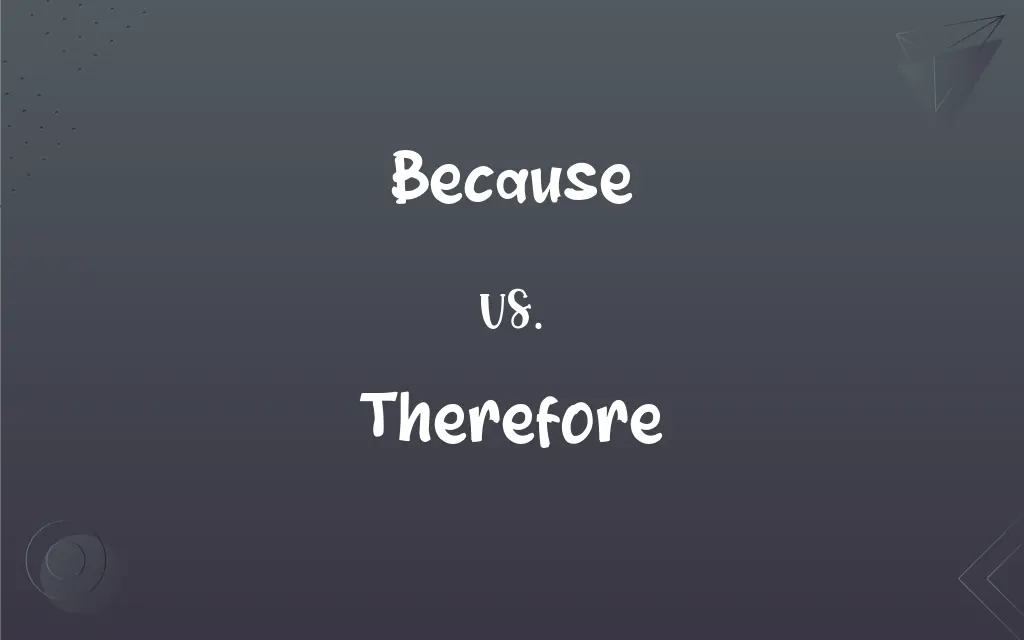Because vs. Therefore: What's the Difference?
Edited by Aimie Carlson || By Janet White || Published on December 15, 2023
"Because" indicates a cause or reason for an action; "therefore" shows a conclusion or result derived from a given statement or situation.

Key Differences
Because is used to introduce a clause explaining the reason or cause for something. It is often used in constructing sentences to justify or explain actions or events. Therefore is a conjunctive adverb that introduces a conclusion or result, indicating the effect of a previously stated cause.
When using because, the focus is on the reason behind an action or event. It provides the groundwork or rationale for something that happens or is done. In contrast, therefore is used to present the outcome or conclusion that naturally follows from the provided information, often used in arguments or logical deductions.
In sentence construction, because typically precedes a clause that explains the cause. It is used to link actions with their motivations or circumstances with their explanations. Therefore is used to indicate a logical conclusion and can often be replaced with words like 'consequently' or 'as a result'.
Because is integral in explaining why something is the way it is, often answering questions that begin with "why". Therefore is used to articulate a logical consequence or inference, connecting premises with conclusions in both everyday language and formal logic.
Therefore suggests a more formal or logical sequence of thought, often found in academic or formal writing. Because, on the other hand, is commonly used in both formal and informal contexts, as it is a fundamental part of explaining reasons and causes in everyday language.
ADVERTISEMENT
Comparison Chart
Function in a Sentence
Introduces a reason or cause
Introduces a conclusion or result
Usage
To explain or justify
To deduce or infer
Sentence Position
Precedes the explaining clause
Often starts or breaks in a sentence
Type of Link Created
Causal link
Logical link
Common Context
Everyday and formal communication
More formal or logical reasoning
ADVERTISEMENT
Because and Therefore Definitions
Because
Because introduces the reason for something happening.
She was late because her car broke down.
Therefore
Therefore is used to show the result of a given fact.
He didn't study; therefore, he failed the exam.
Because
Because is used to explain or justify an action.
He apologized because he realized his mistake.
Therefore
Therefore indicates a conclusion derived from a statement.
It is raining, therefore the ground is wet.
Because
Because answers the question of 'why' something occurs.
They won because they played well.
Therefore
Therefore connects premises with logical consequences.
All humans are mortal; therefore, I am mortal.
Because
Because links an event with its cause.
The event was canceled because of the rain.
Therefore
Therefore often introduces the outcome of an argument.
She is the most qualified candidate, therefore she should be hired.
Because
Because connects actions to their motivations.
I study hard because I want to succeed.
Therefore
Therefore is commonly used in formal or logical contexts.
The data is incomplete; therefore, we cannot draw a conclusion.
Because
For the reason that; since.
Therefore
For that reason or cause; consequently or hence.
Because
(archaic) For the reason that.
Therefore
(conjunctive) Consequently, by or in consequence of that or this cause; referring to something previously stated.
Traditional values will always have a place. Therefore, they will never lose relevance.
FAQs
Is 'therefore' a formal word?
Yes, it's often used in formal or logical contexts.
How is 'therefore' used differently from 'because'?
'Therefore' is used to introduce a conclusion, unlike 'because' which introduces a reason.
Can 'because' start a sentence?
Typically, it's used in the middle of a sentence, but starting with it is also grammatically correct.
What does 'because' indicate in a sentence?
It indicates the reason or cause for something.
How does 'because' affect sentence structure?
It usually introduces a subordinate clause explaining the main clause.
What type of word is 'because'?
It's a conjunction that connects clauses.
Is 'because' suitable for academic writing?
Yes, when used to explain reasons or causes.
Can 'because' and 'therefore' be used interchangeably?
No, they serve different purposes in a sentence.
Is 'therefore' used in everyday conversation?
Yes, but it's more common in formal or logical discussions.
What can replace 'therefore' in a sentence?
Words like 'consequently' or 'thus' can replace it.
What is a common mistake in using 'therefore'?
Using it where causality isn't logically clear.
Does 'therefore' always indicate causality?
It indicates a logical result rather than direct causality.
Can 'because' be used in formal writing?
Yes, it's appropriate in both formal and informal contexts.
How does 'therefore' influence an argument?
It helps in logically concluding an argument.
Can 'therefore' be used to infer something?
Yes, it's often used to infer conclusions.
What part of speech is 'therefore'?
It's an adverb used to connect ideas.
How does 'because' enhance communication?
It provides clarity by explaining reasons.
Is 'therefore' a conjunction or an adverb?
It's primarily an adverb.
Can 'because' introduce a conclusion?
No, it introduces reasons, not conclusions.
What is an example of 'because' in a question?
"Why are you late?" "Because my car broke down."
About Author
Written by
Janet WhiteJanet White has been an esteemed writer and blogger for Difference Wiki. Holding a Master's degree in Science and Medical Journalism from the prestigious Boston University, she has consistently demonstrated her expertise and passion for her field. When she's not immersed in her work, Janet relishes her time exercising, delving into a good book, and cherishing moments with friends and family.
Edited by
Aimie CarlsonAimie Carlson, holding a master's degree in English literature, is a fervent English language enthusiast. She lends her writing talents to Difference Wiki, a prominent website that specializes in comparisons, offering readers insightful analyses that both captivate and inform.






































































